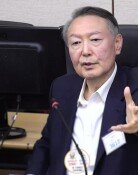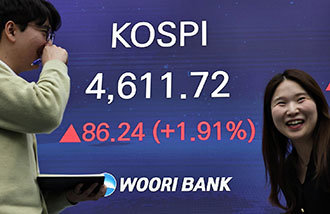Defamation Versus Immunity for Lawmakers
Defamation Versus Immunity for Lawmakers
Posted August. 20, 2005 03:04,
Regarding Democratic Labor Party lawmaker Roh Hoe-chans disclosure of the names of the former and incumbent prosecutors who allegedly took kickbacks from the Samsung Group through the illegally bugged tapes made by the National Security Planning Agency, the predecessor of the National Intelligence Service, controversy over whether his divulgence is considered illegal is rising.
Regarding the names, Representative Roh distributed a press release to the pressroom in advance in addition to mentioning the names in a meeting of the Legislative and Judiciary Committee of the National Assembly, as well as posted these materials on his website.
In terms of general viewpoints, lawmaker Rohs disclosure can be regarded as the violation of the Communication Confidentiality Law in that he not only made public the real names of the prosecutors mentioned in the illegally recorded tapes, but also the contents of the tapes. Article 16 of the Communication Confidentiality Law stipulates that the person who reveals or leaks contents of illegally wiretapped materials will be sentenced to more than 10 years in prison and five years and below in suspension of qualification. If Rohs divulgence turns out to be false, responsibility for defamation might be added to his charges.
Another question lies in Rohs disclosure in regards to whether his remarks can come under the scope of immunity for lawmakers.
All admit that Representative Rohs utterance in a meeting of the Legislative and Judiciary Committee of National Assembly is within the purview of immunity for lawmakers. Article 45 of the Constitution stipulates that regarding lawmakers utterance and votes as a matter of their duties in the National Assembly, they do not take responsibility for those things outside the National Assembly.
However, in regards to Rohs distributing of a press release to a pressroom, there are different opinions over whether it can be held under immunity for lawmakers.
Concerning former lawmaker Yoo Seong-hwans case in which he was indicted on charges of distributing a press release saying national policies should be not anti-communism but unification (violation of the National Security Law) in 1987, the Supreme Court dismissed the accusation by broadly interpreting immunity for lawmakers in 1992.
Citing this judicial precedent, the prosecution ruled that there is no right of arraignment to then-National Congress for New Politics Party lawmaker Choo Mi-ae, who was sued for defamation by distributing materials regarding rumors of the inflow of a certain construction company in Busans funds into to the New National Party, in 1997.
A senior jurist, however, said, Regarding the scope of the problematic immunity for lawmakers, it needs to change judicial precedents by indicting, rather than merely following the existing judicial precedents by the Supreme Court.
Concerning Representative Rohs action in which he posted the materials on his website, there are numerous views that it does not come under the scope of immunity for lawmakers.
An official of the prosecution said, Two conditions that a remark must be uttered within the National Assembly and as a matter of duty must be required to apply the privilege of immunity for lawmakers. He added, As for Rep. Rohs action in which he posted the press release on his Internet homepage, it does not meet the two conditions because it targeted people outside the National Assembly.
jin0619@donga.com



![쓸개 파열로 “사흘 남았다” 판정받은 시인…18년뒤 “너를 아껴라” 속삭여[손효림의 베스트셀러 레시피]](https://dimg.donga.com/c/138/175/90/1/wps/NEWS/IMAGE/2026/01/08/133113134.1.jpg)

![“‘휴지심’ 아직도 버려?” 0원으로 집안 환경 바꾸는 법 [알쓸톡]](https://dimg.donga.com/c/138/175/90/1/wps/NEWS/IMAGE/2026/01/07/133110227.3.png)

